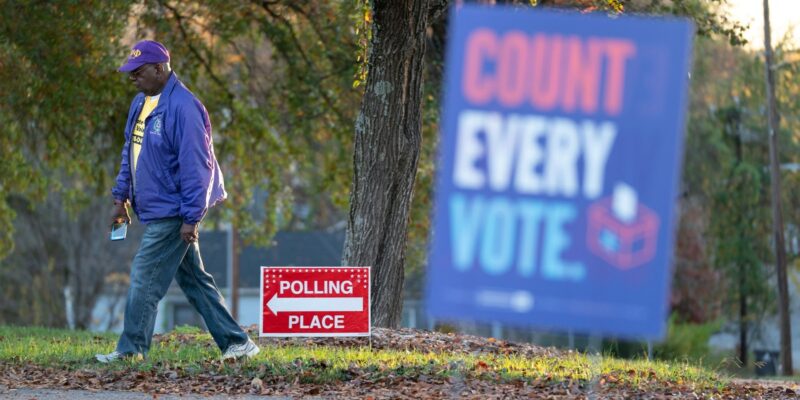
North Carolina Republicans on Friday passed a major power grab, stripping the state’s Democratic governor of the authority to appoint a majority of members to state and county election boards and giving the heavily gerrymandered GOP legislature far more influence over how elections are run and certified in the battleground state.
In North Carolina, the governor dictates the political makeup of the state and county election boards, which are each composed of five members. Under Democratic Gov. Roy Cooper, the boards have three Democrats and two Republicans. The governor appoints the members of the state board and the chair of the county boards. Under the new bill, those bodies would be evenly divided, with legislative leaders choosing the members of the state and local boards.
While that is theoretically more bipartisan, it is a recipe for gridlock that could hand sweeping new powers to Republicans in the legislature, who have a supermajority in both chambers due to the gerrymandered maps they drew in 2021.
If the state election board deadlocks and cannot certify a winner of an election, that power would instead go to the legislature. That means Republicans could determine the state’s presidential electors and potentially subvert the popular vote winner of the state if a Democrat carries North Carolina. “The legislature now gets to decide the outcome of all of our elections,” says Melissa Price Kromm, executive director of North Carolina Voters for Clean Elections, a pro-democracy coalition in the state. “When people vote is the will of the people still going to be accepted in North Carolina?” (State and federal courts could still order that elections be certified, and in presidential elections the legislature would need to comply with the revamped Electoral Count Act passed by Congress in 2021, which makes it harder for rogue legislatures to overturn the will of the voters.)
The bill also makes it easier to overturn elections in another way: only five of eight members of the new state board need to vote in favor of redoing an election, compared to four out of five members under the previous law (the board would grow in size from five members to eight under the new bill).
In addition to subverting fair election outcomes, the bill could lead to a huge decrease in voter access as well. Local election boards currently determine the number of early voting sites in a county, but if those boards deadlock under the new legislation there would only be one early voting location per county. That would dramatically limit the number of early voting sites in large urban counties that favor Democrats, leading to much longer lines at the polls. In 2020, for example, Wake County, home to Raleigh, had 20 early voting sites used by 374,000 voters, according to WRAL News. “There would only be one early voting location in counties with more than a million people,” says Price Kromm. “Can you imagine how long the lines would be?”
More than half of North Carolinians used early voting in 2022 and Democrats were more likely to cast a ballot that way. “In the state’s 2022 Senate race, writes Daniel Walton of Bolts magazine, “in-person early voters favored Democratic candidate Cheri Beasley by five percentage points, even as she lost the election overall by more than three percentage points to Republican Ted Budd.”
That’s not all. The legislation could also lead to the ouster of the current executive director of the state board of elections, Karen Brinson Bell, who is widely respected but has been targeted by election deniers for extending the deadline for returning mail ballots during the pandemic. If the state board cannot come to an agreement on the board’s executive director by July 15, 2024, Republicans in the legislature would get to make the selection, allowing them to put in place someone who is more allied with the GOP just months before the 2024 election.
The new legislation follows similar moves by the GOP in other battleground states that are designed to give election deniers and conspiracy theorists more influence over how elections are run.
Last week, Republicans in the Wisconsin Senate voted to oust the nonpartisan administrator of the state’s elections commission. In May, the GOP-controlled Texas legislature voted to abolish the position of election administrator and give the GOP-appointed secretary of state the power to take over election operations exclusively in Houston’s Harris County, the most populous blue county in the state.
North Carolina Republicans are pursuing a multi-pronged strategy of election subversion and voter suppression to gain an electoral advantage in the state, which Trump narrowly won and which in recent years has seen close statewide races for governor and US Senate. They also passed another bill in August that undercuts Election Day registration, gives voters less time to cast ballots by mail, and expands voter challenges. That legislation was inspired, at least in part, by conservative activist Cleta Mitchell, one of the architects of Trump’s effort to overturn the election, who consulted with North Carolina Republicans on its drafting.
“It’s going to be harder to vote and harder to have your vote counted,” says Price Kromm.
Cooper has promised to veto both bills, but the legislature is expected to override them. “This legislation has nothing to do with election security and everything to do with Republicans keeping and gaining power,” the governor said.
Republicans have been trying to undermine fair elections in North Carolina for years.
GOP attempts to gain more control over election boards were previously blocked by the state Supreme Court and soundly rejected by 61 percent of voters through a ballot referendum in 2018. Similarly, a law passed by North Carolina Republicans shortly after the Supreme Court gutted the Voting Rights Act that limited ballot access by adding strict ID requirements, cutting early voting, and ending same-day registration was found by a federal court to target Black voters with “almost surgical precision.”
But with conservatives now comprising a majority on the state Supreme Court and Republicans holding supermajorities in the legislature, they’re emboldened to go to nearly any length to cement their grip on power.















